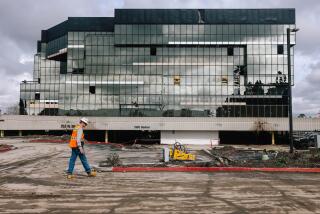The boss wants you to give up your desk, and it’s probably to cut costs
Like fax machines and desktop telephones, your individual office workspace may be headed for extinction.
More than half of corporate executives say they plan to switch to unassigned worker seating for all or some of their employees during the next three years. Instead of having their own desks, workers will grab an empty workstation when they come to the office in the morning.
Don’t be late to work, or you could wind up sitting by the smelliest trash bin.
It’s just one of the ways employers are shaking up the traditional office environment to cut costs and — supposedly — increase productivity, according to a new report by commercial real estate firm CBRE.
In the last decade, business employers have increasingly shifted from individual offices to open work environments. They usually say the moves are to increase collaboration among workers.
But major office users also acknowledge that with these changes, they are slashing real estate costs.
At a growing number of office centers, including JPMorgan Chase’s new campus in Plano, Texas, and Liberty Mutual Insurance across the street, many workers don’t have assigned desks and keep their personal items in a locker or cabinet when they leave.
“The modern workplace is in a state of transition as workplace design standards have evolved from traditional layouts with a mix of enclosed and open workspaces,” CBRE research analyst Julie Whelan said in the new report. “Managing employees through this change is critical, so that the initiative is viewed as being additive to productivity and wellness instead of a pure cost-cutting measure.”
The moves, it appears, are only partially to build teamwork and promote employee networking.
More than 50% of the firms surveyed said their primary reason for the office changes is to reduce costs. Only 20% of companies said they are going to the new office environments to promote innovation. And less than a third said the changes are to retain and attract talent.
CBRE surveyed mostly banking and finance, tech and telecom and professional service firms about their office plans.
Almost half of the companies said they planned to make workplace changes to seek better use of space. Less than half said they plan to allocate primary assigned worker seating in the years ahead.
Not all trends are as utilitarian.
To keep their workers happy, office users say they plan to ramp up their workplace amenities, including full-service cafeterias, employee showers, bike racks for commuters, custom coffee services, green space, game rooms and on-site healthcare.
“Twenty years ago, real estate was much different. It was a place to house people. But now our clients are using it as a tool to attract and retain the best talent in their respective industries,” said CBRE’s Clay Vaughn, a senior vice president in Dallas. “A big part of creating great space is giving employees options of how and where they work in the office.”
“The companies that embrace this,” Vaughn said, “will be the winners in the fierce competition for talent.”
Even if that means giving you a locker to call your own instead of a desk.
Brown writes for the Dallas Morning News/McClatchy.
More to Read
Inside the business of entertainment
The Wide Shot brings you news, analysis and insights on everything from streaming wars to production — and what it all means for the future.
You may occasionally receive promotional content from the Los Angeles Times.










